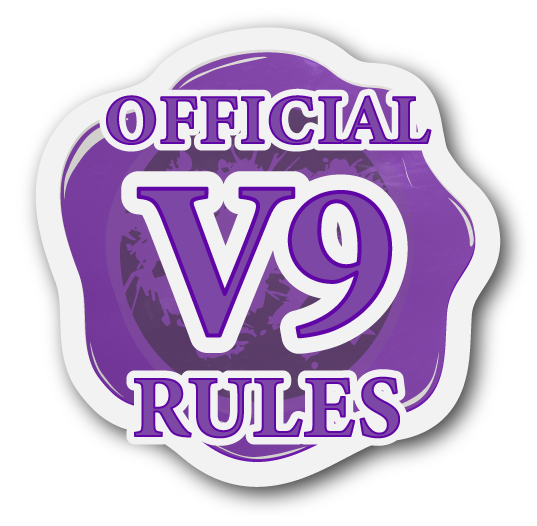V9: Custom Rules and Accommodations
- The Amtwiki is the official home and primary source for Amtgard V9 Rules as of February 25, 2023.
- These rules are currently in Open Alpha Playtest. See the Playtest Disclaimer for more details.
- To learn more about Amtgard V9 Development, please visit Amtgard.com.
- To view the current Amtgard V8 ruleset, please see the Amtgard V8 Rulebook.
Contents
Custom Rules and Accommodations
In order to encourage fun and enjoyable experiences, Game Organizers are allowed to modify the way the game is played or create new rules that are only in effect for their particular game or activity.
To give a better understanding of how custom rules and mechanics can be useful, consider the following:
- Game-Specific Balance: With the infinite variety of potential game modes and objectives, it is possible that some rules or abilities can end up being too dominant or impactful in a given activity. In these cases, it can be beneficial to modify or prohibit them altogether to preserve fairness, fun, and/or competitive integrity.
- Enhancing Flavor or Immersion: Custom mechanics can be used to present more immersive experiences beyond what is normally allowed, such as lava pits, breath attacks, weather effects, and more!
- Accessibility & Accommodation: Game Organizers and Rules Authorities are empowered and encouraged to create custom rules to help include those who may need accommodation in order to participate, whether due to an injury, disability, weather conditions, or any another reason.
With Great Power Comes Great Responsibility
Custom rules can quickly turn a game into something that doesn't feel like Amtgard anymore. All modifications should strive to be in line with the actual Amtgard V9 Rules of Play whenever possible and work to support the source rules rather than completely change the way the game is played. In all instances, custom rules and mechanics must be clearly explained to all participants before the game begins.
Accommodations
Amtgard seeks to be an inclusive, welcoming, and empowering experience for all players. Game Organizers and Rules Authorities are encouraged to make exceptions or special accommodations as necessary to foster this inclusive environment whenever possible.
Accommodations are intended to enable fair participation and should never been seen as something to be optimized or sought out for gameplay advantage. Rather, they are intended to cut through the red tape of the written rules and help our members participate more easily, comfortably, and sometimes even at all.
- Players with disabilities or injuries could be granted special rules to help offset their condition and make it easier to participate. A player with a speech impediment might be allowed to use pre-recorded lines to cast magic; a players with mobility issues could be allowed to respawn further up field instead of walking back to base after each death; a fragile bow-user might be stationed as an immobile turret with a cardboard target nearby that players can attack instead of them.
- Players fighting in the heat, cold, or other weather conditions could be allowed accommodations so they can properly dress for the climate. Players in extreme heat might be granted their armor points without wearing the physical pieces. Players in extreme cold might receive 'Look the Part' without wearing full garb so everyone can bundle up for winter.
Developer Note: Accommodations are not a substitute to ensuring one's own personal safety.
Such a responsibility always rests with the player themselves.
Non-Melee Participation (Light Pink Sash Rules)

Players may have reasons to want to avoid becoming involved in melee combat. These players are referred to as Non-Melee Participants.
- Light Pink Sashes are reserved to denote Non-Melee participants. If worn with another sash, they must cross in the opposite direction.
- Non-Melee participation is an accommodation, not a strategic option. Like any other accommodation, a player who wishes to participate in this manner must first speak to and receive permission from the Game Organizer.
- Before a game begins, the Game Organizer should introduce any non-melee participants and explain how the accommodation works so everyone is on the same page.
- Interactions between Regular and Non-Melee participants must be handled in good faith, first and foremost. The goal is to allow a player to participate without being struck in melee, in a way that does not warp gameplay around them. Regular players should be able to participate largely as normal aside from pulling their strikes against these individuals.
Gameplay Rules for Non-Melee Participants
- If you wish to participate as a Non-Melee participant, you must speak with the Game Organizer before entering the battle.
- You should not just throw on a Light Pink Sash and jump into the game without alerting anyone. The sash alone does not prevent you from being struck. The Game Organizer, Rules Authorities, and other players must be aware of your presence and the accommodation itself in order to conduct themselves accordingly.
- You should not just throw on a Light Pink Sash and jump into the game without alerting anyone. The sash alone does not prevent you from being struck. The Game Organizer, Rules Authorities, and other players must be aware of your presence and the accommodation itself in order to conduct themselves accordingly.
- Once in game, if you are approached by someone clearly intending to strike you in melee combat, you must immediately call yourself dead.
- If you are unaware of their presence, they may gently tap you with their weapon to get your attention.
- If you are unaware of their presence, they may gently tap you with their weapon to get your attention.
- You cannot engage in melee combat yourself.
- You cannot use use melee weapons, armor, or shields to attack or defend yourself, nor can you benefit from enchantment effects that grant protection from melee strikes.
- Once engaged at melee range, you cannot attempt to dodge, evade, or escape. If you want to run away, you must do so long before your opponent reaches you. If you are being chased by a melee attacker, you should act in good faith and call dead when they get decently close because the only other way to 'catch' you is going to be by striking you, which is what your sash says they cannot do.
- You can engage and be engaged by projectiles and verbal abilities.
- You may use weapons, armor, shields, and enchantments to defend against these attacks as normal.
- You may use projectile weapons and verbal abilities as normal.
- Players who wish to avoid projectile contact as well should speak with the Game Organizer for further accommodation.
- You cannot derive a gameplay advantage from this accommodation.
- You should never place yourself into situations or interact with others in such a way that would leverage your accommodation to gain an advantage that was not directly intended by the Game Organizer.
- You should never place yourself into situations or interact with others in such a way that would leverage your accommodation to gain an advantage that was not directly intended by the Game Organizer.
- Wearing the sash does not guarantee that you will not be struck in melee.
- Amtgard is a contact activity and participation is always at your own risk. Combat is chaotic and you should expect to be struck accidentally every now and then. In these situations, you must still follow the rules and take the effects of any accidental hits that may occur. That said, repeated or egregious offenses should be reported to a Reeve for investigation.
- Amtgard is a contact activity and participation is always at your own risk. Combat is chaotic and you should expect to be struck accidentally every now and then. In these situations, you must still follow the rules and take the effects of any accidental hits that may occur. That said, repeated or egregious offenses should be reported to a Reeve for investigation.
Tips for fighting AGAINST Non-Melee Players
- When entering the battlefield, take note of any Non-Melee participants so you can be aware of their accommodation if/when it becomes necessary to interact with them. The Game Organizer should point out these players and/or explain the accommodation to you whenever it is being used.
- Avoid striking them in melee, even in jest. If you want to attack them, simply enter melee range and present yourself so that you could strike them and they should call themselves dead. If they are unaware of your presence or intent, a gentle tap from your weapon should be all that is necessary.
- Non-Melee participants can be engaged with projectiles and verbal abilities as normal unless otherwise instructed by the Game Organizer.
Developer Note: Ultimately, the goal of the game is to have fun. While certain accommodations can alter "the meta" or disrupt competitive strategies, that aspect should not be considered more important than the overall enjoyment of all participants.
Since Accommodations will often be created on a case-by-case basis, they will not be perfect on first conception. Accommodations should be tweaked and adjusted to avoid disruptively powerful effects, and communities should be supportive, respectful and compassionate towards the Organizers, Rules Authorities, and affected players that are trying to make these accommodations work.
Combat Activities Core Game Mechanics · Game Modes · Custom Rules and Accommodations · Game Organizer Guide


